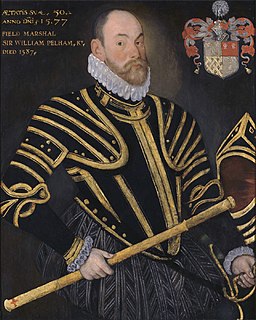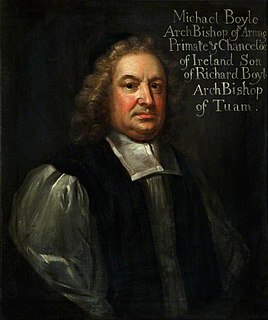| |||||
| Centuries: | |||||
|---|---|---|---|---|---|
| Decades: | |||||
| See also: | Other events of 1687 List of years in Ireland | ||||
Events from the year 1687 in Ireland.
| |||||
| Centuries: | |||||
|---|---|---|---|---|---|
| Decades: | |||||
| See also: | Other events of 1687 List of years in Ireland | ||||
Events from the year 1687 in Ireland.

Anglo-Irish people denotes an ethnic, social and religious grouping who are mostly the descendants and successors of the English Protestant Ascendancy in Ireland. They mostly belong to the Anglican Church of Ireland, which was the established church of Ireland until 1871, or to a lesser extent one of the English dissenting churches, such as the Methodist church, though some were Roman Catholics. They often defined themselves as simply "British", and less frequently "Anglo-Irish", "Irish" or "English". Many became eminent as administrators in the British Empire and as senior army and naval officers since Great Britain was in legislative and personal union with the Kingdom of Ireland for over a century.

The lord chancellor, formally the lord high chancellor of Great Britain, is the highest-ranking among the Great Officers of State in Scotland and England, in the United Kingdom, nominally outranking the prime minister. The lord chancellor is appointed by the sovereign on the advice of the prime minister. Prior to their Union into the Kingdom of Great Britain, there were separate lord chancellors for the Kingdom of England and the Kingdom of Scotland; there were lord chancellors of Ireland until 1922.
The Lord High Chancellor of Ireland was the highest judicial office in Ireland until the establishment of the Irish Free State in 1922. From 1721 to 1801, it was also the highest political office of the Irish Parliament: the Chancellor was Speaker of the Irish House of Lords. The Lord Chancellor was also Lord Keeper of the Great Seal of Ireland. In all three respects, the office mirrored the Lord High Chancellor of Great Britain.
Henry Arundell, 3rd Baron Arundell of Wardour, PC was a Peer of England during the 17th century, and the most famous of the Lords Arundell of Wardour. He served as Lord Privy Seal and Lord High Steward, and was appointed to the Privy Council. During the Popish Plot he suffered a long period of imprisonment, although he was never brought to trial.
The Lord High Steward of Ireland is a hereditary Great Officer of State in the United Kingdom, sometimes known as the Hereditary Great Seneschal. The Earls of Shrewsbury have held the office since the 15th century. Although the Irish Free State, later the Republic of Ireland, became independent in 1922, the title remained the same, rather than reflecting the region of Northern Ireland, which remains within the United Kingdom.

The Lords Justices were deputies who acted collectively in the absence of the chief governor of Ireland as head of the executive branch of the Dublin Castle administration. Lords Justices were sworn in at a meeting of the Privy Council of Ireland.
Events from the year 1694 in Ireland.
Events from the year 1686 in Ireland.
Events from the year 1672 in Ireland.
Events from the year 1695 in Ireland.
Events from the year 1700 in Ireland.
Sir Richard Bolton was an English lawyer and judge, who was an important figure in Irish political life in the 1630s and 1640s.

Michael Boyle, the younger was a Church of Ireland bishop who served as Archbishop of Dublin from 1663 to 1679 and Archbishop of Armagh from 1679 to his death. He also served as Lord Chancellor of Ireland, the last time a bishop was appointed to that office.
Sir John Davys was an Irish politician.
Fortescue is a British surname that originated from the Old Norman epithet Fort-Escu. People with the name include:
Thomas Nugent was an Irish Roman Catholic barrister who became Lord Chief Justice of Ireland under James II of Great Britain, and held a 1689 title as Baron Nugent of Riverston.
Sir William Davys was an Irish barrister and judge who held the offices of Recorder of Dublin, Prime Serjeant and Lord Chief Justice of Ireland. He was suspected of Roman Catholic sympathies and was threatened with removal from the bench as a result, but he succeeded in retaining office until his death, due largely to his influential family connections.
Events from the year 1669 in Ireland.

Apollo University Lodge No 357 is a Masonic Lodge based at the University of Oxford aimed at past and present members of the university. It was consecrated in 1819, and its members have met continuously since then.
The order of precedence in Ireland was fixed by Royal Warrant on 2 January 1897 during Ireland's ties to the United Kingdom of Great Britain and Ireland.